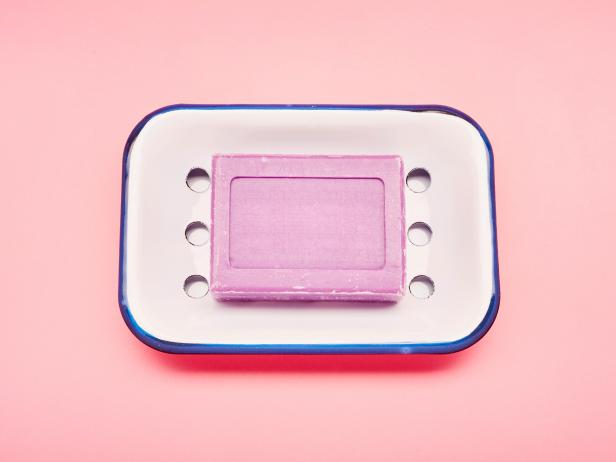Is Bar Soap or Liquid Soap Better for Hand Washing?
We take a dive into all questions you're asking yourself when you get to soap aisle.

the_burtons/Getty Images
Properly washing your hands is one of the best ways to prevent your exposure to any type of illness. But if you can't find liquid soap (or are hoping to use fewer disposable plastic bottles) you have to wonder — is bar soap just as effective? And what's the best way to use and store it?
How Soap Works
Using soap is more effective than water alone since they contain surfactants – substances that reduce friction (aka, they’re slippery). This also forces longer wash times which also helps remove more germs. Bar soap is basically made from a combo of fats, oils and perfumes that come together to create a substance with the ability to (when wet) capture and remove dirt and germs. Liquid hand soaps are technically detergents, meaning they share the cleansing properties of soap but don’t react with the minerals in hard water and are less likely to leave a film (aka soap scum) behind.
Should You Buy Anti-Bacterial Soap?
Both liquid and bar soaps can be found with or without anti-bacterial ingredients. Typically the active ingredient in these soaps is a substance called benzalkonium chloride and most bar and liquid soaps contain a similar amount. But it turns out, these antibacterial chemicals are not a necessity. The Food and Drug Administration (FDA) released a report in 2016 declaring that store-bought soaps with anti-bacterial substances are no more effective than soaps that don’t contain anti-bacterial agents.
Is Bar Soap or Liquid Hand Soap More Sanitary?
Studies have shown that bar soap can harbor bacteria such as E. coli, Staph. aureus, and Staph. Epidermidis. However, a study also showed that even if the bar of soap contains these microorganisms, they do not stay on a person’s hands after properly hand washing with the bar soap. Another recent study also found that bar soap can be effective at cleaning viruses off hands, too. The CDC recommends storing bar soap in a dish with proper drainage so that it doesn’t sit in puddles of water, which can be a haven for germ between uses. According to experts, bar soap is more biodegradable and some argue hand washers use less per handwashing with less temptation to pump multiple squirts of liquid soap. While a bottle of liquid hand soap may look better on your bathroom vanity, bar soaps are also more affordable.
Bottom Line: Wash. Your. Hands! When done properly bar and liquid soaps can be equally effective.
How to Wash Your Hands the Right Way
The Centers for Disease Control (CDC) has an easy to follow five-step plan to successfully wash your hands. Wet and lather, scrub for at least 20 seconds, rinse under running water and finally, dry well. When soap and water isn’t available, 60% alcohol hand sanitizer should be used. According to the CDC, the most important times to wash your hands include before, during and after preparing food, before eating, after using the restroom and of course, after blowing your nose, sneezing and coughing – for a complete list visit the CDC website.
Related Content:




























